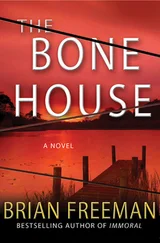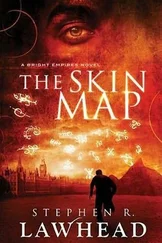Stephen Lawhead - The Bone House
Здесь есть возможность читать онлайн «Stephen Lawhead - The Bone House» весь текст электронной книги совершенно бесплатно (целиком полную версию без сокращений). В некоторых случаях можно слушать аудио, скачать через торрент в формате fb2 и присутствует краткое содержание. Жанр: Фэнтези, на английском языке. Описание произведения, (предисловие) а так же отзывы посетителей доступны на портале библиотеки ЛибКат.
- Название:The Bone House
- Автор:
- Жанр:
- Год:неизвестен
- ISBN:нет данных
- Рейтинг книги:4 / 5. Голосов: 1
-
Избранное:Добавить в избранное
- Отзывы:
-
Ваша оценка:
- 80
- 1
- 2
- 3
- 4
- 5
The Bone House: краткое содержание, описание и аннотация
Предлагаем к чтению аннотацию, описание, краткое содержание или предисловие (зависит от того, что написал сам автор книги «The Bone House»). Если вы не нашли необходимую информацию о книге — напишите в комментариях, мы постараемся отыскать её.
The Bone House — читать онлайн бесплатно полную книгу (весь текст) целиком
Ниже представлен текст книги, разбитый по страницам. Система сохранения места последней прочитанной страницы, позволяет с удобством читать онлайн бесплатно книгу «The Bone House», без необходимости каждый раз заново искать на чём Вы остановились. Поставьте закладку, и сможете в любой момент перейти на страницу, на которой закончили чтение.
Интервал:
Закладка:
He glimpsed the first dog as he passed the third house on the edge of the hamlet; the animal was quickly joined by two more, which were in turn trailed by a pack of curious children. They all stared at him, dogs and kids, with wide dark eyes. Kit smiled and waved, which sent the youngsters racing off to find their elders, setting off a general commotion of greeting for a stranger who had wandered out of the desert.
Kit was mightily relieved to discover that his first attempts at communication were met with success. Whatever time he had landed in, Westerners were apparently a common enough sight among the locals that it did not provoke instant alarm; at least, his appearance did not send them reaching for weapons or running for cover. Instead, as the small crowd of villagers gathered around, a dark-skinned older fellow with stubbly grey hair stepped forward and handed Kit a clay cup full of water, which Kit accepted with a smile and nod. Kit tipped the cup to his lips and guzzled it down. The man watched him, then said, “Deutsch? Francais?”
“English,” replied Kit, wiping his mouth. “ Parlez vous English?”
“Non,” said the man. He laid hold of a nearby boy and spoke a quick command that sent the lad racing away. Turning back to Kit, he said, “Francais?”
“No,” replied Kit, passing back the empty cup.
The man sighed with weary resignation, and then everyone stood looking at each other and at Kit until a slender young man in a white kaftan appeared.
“Hello, sir,” he said, pushing his way through the throng. “I am Khefri.”
“You speak English.”
The young man nodded gravely. “What is your name, sir?”
“Call me Kit,” he said. “Kit Livingstone.”
“How can we help you, Kit Livingstone?”
“I am travelling hereabouts,” replied Kit. “I am on my way to Luxor. Do you know of anyplace where-”
“You are on foot?”
“Yes.”
“You have been in the desert?”
“Yes, that’s right. I-”
“You have been in the desert on foot?”
“Yes, you see, I am looking for someone.”
“You are looking for someone,” repeated Khefri, his large dark eyes narrowing in disbelief, “in the desert on foot?”
“As it happens, yes,” said Kit, feeling that this line of questioning could go on for quite some time. “But now I am on my way to Luxor-”
“You have money?” wondered Khefri.
“A little,” replied Kit. Wilhelmina had given him a handful of coins. “Not much.”
“This is my father,” said the youth, indicating the older man, who was now smiling and nodding in welcome. “He is head man of this village. You will stay with us tonight, and I will take you to Luxor in the morning.”
“Great,” said Kit. “Terrific. I mean, thank you very much.”
“It is pleasure. The cost will be six dinar.” Khefri exchanged a few words with his father, then said, “You are invited to come now and share a meal with us. My father would speak to you of your England.”
“I would be delighted,” said Kit, trying on his most charming manner. “But I do not wish to put you to any trouble.”
“It is not trouble for us,” replied Khefri. “Hospitality is a duty. If you will please to follow me, I will take you now.”
The dark-eyed young man turned and pushed his way through the onlookers, crying for them to make way. Kit followed in his wake, in a procession that displayed all the qualities of a two-man parade.
“You speak very good English,” Kit pointed out from his place a few steps behind his guide. “Where did you learn?”
“In my school. I went to a mission school in Al-Qahira,” he explained. “The brothers there, they teach me good.”
“I’ll say.”
“I finish school two years ago. Now I work in Luxor.”
“What do you do?”
“I am guide sometimes,” he replied. “Sometimes I help my cousin with his boat. My cousin, he speaks French. We help each other.”
“I see,” nodded Kit appreciatively. “So together you cover the waterfront.”
“Here is our house.”
Kit looked up to see that they were standing outside of the largest house in the village. Oil lanterns were alight along the rooftop, illuminating a sizeable cloth marquee.
Khefri led him to the front door. “Please to come in,” he said, kicking off his shoes. “You are guest.”
“My thanks,” said Kit, removing his shoes. “If you don’t mind my asking, what year is it?”
Khefri regarded him quizzically. “You wish to know the year?”
“If possible.”
“It is the year twelve hundred and thirty-five,” replied the young man with a shrug.
“Ah,” said Kit, his heart sinking at the thought that he had seriously overshot the mark and wound up in medieval Egypt. But that erroneous assumption was swiftly overturned by the bald facts: the mission school, the oil lamps, the guide business, and all the rest.
“By the calendar of England,” Khefri continued, “it is the year one thousand eight hundred and twenty-two.”
“That’s more like it,” said Kit, not at all certain what conditions might greet him in 1822. Whatever they were, they would have to be more amenable than those that existed in the Middle Ages.
“Please to enter now.”
The interior of the house was dark and the air thick with the oily scent of heavily spiced cooking. His mouth watered and his empty stomach rumbled. Whatever they were making, Kit was certain he could eat his weight of it. He padded after his young host, who led him through the lower floor, which featured a single large room divided by a woven curtain. Rugs covered the floor, and cushions of various sizes were strewn about the perimeter; in the centre of the room stood a low table with a large round top of hammered brass. Khefri led him out to the back of the house where two women and two young girls were tending a charcoal fire over which a very large and very black cauldron was bubbling.
One of the women was spreading a thin layer of dough over the bottom of a round cast-iron vessel to make flat bread. She looked up as Khefri approached, concern visible on her round face. A word from him and she lowered her head; then, taking up a newly cooked round of wafer-thin bread, she tore it in half, rose, and, stepping around the fire, presented it to Kit.
“This is my mother,” Khefri informed him. “Her name is Mariam.”
Kit accepted the warm bread with a smile and nod. “How do you say thank you in Egyptian?”
“Shukran,” replied his young guide. “Just say shukran.”
Kit repeated the word and added her name, saying, “ Shukran, Mariam.” The young man’s mother hid her mouth and laughed, then made a comment to her son before returning to her cooking. “What did she say?” wondered Kit.
“My mother says you are very tall and not too ugly,” answered Khefri. “She thinks you would make a good husband for Bet-that is my oldest sister.”
“Please tell her that when I decide to find a wife, I will come here first,” Kit said.
This remark, when translated, was the cause of much sniggering among the women around the fire. The two younger girls stole glances at their visitor and laughed behind their hands.
Khefri’s father arrived just then and, with a show of pride, laid a hand to his chest and said, “I am Ramesses. Pleased to meet you.”
“And I am very pleased to meet you, Ramesses,” replied Kit, extending his hand. “You have the name of a very famous pharaoh.”
The elder man smiled and nodded.
“He does not speak English,” Khefri told him. “That is all he knows.”
“Tell him that Ramesses is a very famous pharaoh. Everyone in England has heard of him.”
“He knows that. Ramesses is not his real name,” the young man explained. “His real name is Copt. Very old fashioned-too difficult to pronounce. Everyone knows him as Ramesses.”
Читать дальшеИнтервал:
Закладка:
Похожие книги на «The Bone House»
Представляем Вашему вниманию похожие книги на «The Bone House» списком для выбора. Мы отобрали схожую по названию и смыслу литературу в надежде предоставить читателям больше вариантов отыскать новые, интересные, ещё непрочитанные произведения.
Обсуждение, отзывы о книге «The Bone House» и просто собственные мнения читателей. Оставьте ваши комментарии, напишите, что Вы думаете о произведении, его смысле или главных героях. Укажите что конкретно понравилось, а что нет, и почему Вы так считаете.







